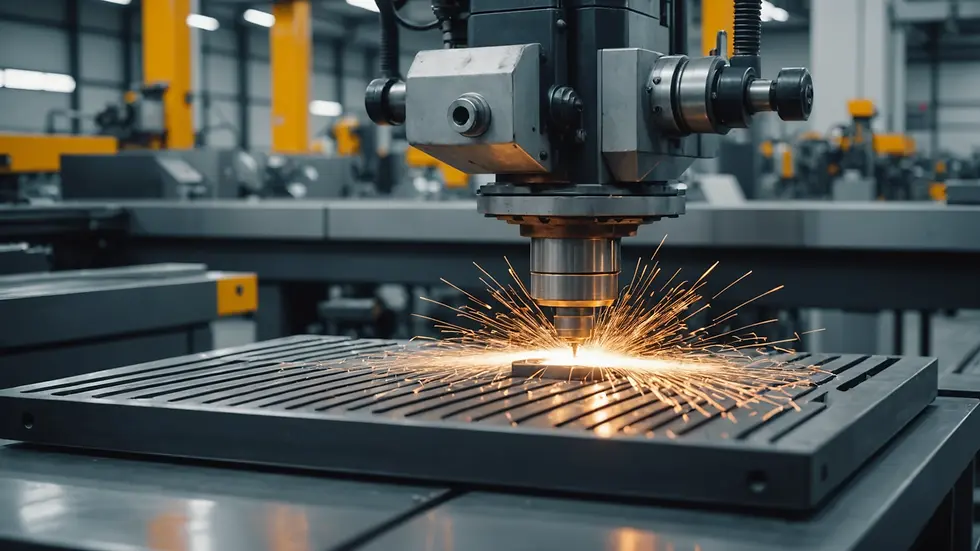How Industry 4.0 Revolutionizes Metal Part Manufacturing
- Adriana Gutierrez, Digital Media Producer

- Jan 6, 2025
- 4 min read
Updated: May 6, 2025
Transforming Manufacturing Through Technology
In recent years, "Industry 4.0" has become a buzzword, particularly in manufacturing. This technological shift integrates advanced digital technologies that revolutionize production processes, ultimately boosting efficiency and productivity. While its impact spans various industries, this article focuses on how Industry 4.0 is specifically transforming metal part manufacturing.
Industry 4.0 encompasses key technologies such as the Internet of Things (IoT), artificial intelligence (AI), big data, and automation. By combining these elements, manufacturers create intelligent systems capable of real-time responses to shifting conditions. Understanding how Industry 4.0 affects metal part manufacturing can help businesses seize opportunities while managing potential risks in this fast-paced environment.
Overview of Industry 4.0
Industry 4.0, known as the Fourth Industrial Revolution, represents a significant leap forward in manufacturing. This movement blends advanced technologies to construct smart factories where machines and systems collaborate seamlessly, leading to enhanced operations.
Key components of Industry 4.0 include:
Connecting with the Internet of Things (IoT)
The IoT connects devices to share vital data. In the context of metal manufacturing, machines with sensors provide real-time insights regarding performance, maintenance requirements, and production metrics. For example, a facility that implemented IoT sensors reported a 25% reduction in unexpected breakdowns due to timely maintenance alerts.
Enhancing Operations with Artificial Intelligence (AI)
AI transforms manufacturing through predictive analytics and automation. In metal part production, AI can analyze operational data to pinpoint inefficiencies. A metalworking company using AI to optimize processes noted a cost reduction of 15% in production expenses over six months.
Leveraging Big Data
Today’s manufacturing generates enormous amounts of data. When effectively leveraged, big data reveals trends and informs decision-making. For instance, a manufacturer that tracked production quality over time found a 30% improvement in product consistency after implementing data-driven quality checks.
Embracing Automation
Automation streamlines repetitive tasks and reduces human error. In metal manufacturing, robots can handle intricate operations, significantly increasing production rates. A factory that automated its welding process doubled its output while improving precision.
The Impact of Smart Factories
Improving Production Methods
Smart factories harness Industry 4.0 technologies for substantial manufacturing improvements. Real-time data allows for proactive maintenance, lowering downtime and enhancing overall equipment effectiveness (OEE). Companies that adopted smart systems often experience up to a 20% increase in OEE, giving them an edge in the competitive metal part manufacturing market.
Customization and Flexibility
One of the most striking features of smart factories is their adaptability. Manufacturers can modify products to meet specific customer needs without incurring the excessive costs usually tied to custom production runs. This approach fosters higher customer satisfaction and can result in an uptick in market share. For example, a manufacturer that embraced flexible production systems saw a 40% increase in customer orders.

Optimizing the Supply Chain
With Industry 4.0, manufacturers gain better transparency throughout the supply chain. This enhanced communication among suppliers, producers, and customers improves inventory management, reduces lead times, and minimizes waste. One notable advantage is that manufacturers using smart contracts could cut transaction processing times by 50% compared to traditional methods.
Implications of Industry 4.0 for Metal Manufacturing
Boosting Efficiency
The efficiency gains in metal part manufacturing from adopting Industry 4.0 technologies can be significant. Tasks that used to require hours can now be completed in a fraction of the time due to automation and real-time monitoring. Companies report a 30% reduction in operational costs as machinery becomes more efficient.
Ensuring Quality and Predictive Maintenance
IoT and AI devices enable real-time quality monitoring. Immediate detection of quality deviations allows for quick corrective measures, often preventing larger issues. Predictive maintenance further improves performance by forecasting equipment failures, which can reduce maintenance costs by 25% for proactive manufacturers.
Prioritizing Worker Safety
Automation and thoughtful factory layouts enhance workplace safety. Robotic assistance in handling heavy materials decreases the chances of worker injuries. Additionally, real-time monitoring systems can alert personnel to unsafe conditions before they become serious, improving overall safety levels across the board.
Facing the Challenges of Implementing Industry 4.0
Despite the clear advantages, manufacturers encounter challenges during the transition to Industry 4.0:
High Initial Investment
Adopting Industry 4.0 technologies often requires significant financial investments. Manufacturers must consider the costs associated with new equipment and process overhauls, weighing these against the long-term advantages.
Workforce Transition
Shifting toward automation means employees must adapt to new technologies. Workers may need training, leading to a gap between existing skills and the demands of new systems. Companies that invest in comprehensive training programs often see a quicker, smoother transition, benefiting productivity in the long run.
Securing Data
With increased connectivity comes the heightened risk of cyber threats. Manufacturers must focus on advanced cybersecurity measures to safeguard sensitive data, ensuring their operations remain secure and efficient.
Real-World Examples of Transformation
Case Studies of Increased Efficiency
Many companies have effectively embraced Industry 4.0, demonstrating the potential for metal part production. For instance, a prominent automotive supplier adopted IoT solutions, resulting in a remarkable 30% boost in operational efficiency.
A smaller operation integrated AI-driven analytics, enhancing forecasting accuracy and achieving a 20% reduction in raw material waste. This data-driven approach underscores how even modest implementations can yield significant gains.

Envisioning the Future of Metal Part Manufacturing
Commitment to Sustainability
With an increased focus on sustainability, the technologies inherent in Industry 4.0 can promote more eco-friendly practices. Smart factories are better placed to optimize resource use, notably reducing energy consumption and waste generation.
Driving Innovation
Industry 4.0 fosters collaboration between research institutions and manufacturers, opening doors for advancements in metal part manufacturing. Collaborative efforts can lead to groundbreaking materials and processes, providing companies with valuable competitive advantages.
Advanced Material Integration
Looking ahead, Industry 4.0 may allow the incorporation of sophisticated materials, like composites and high-strength alloys, into metal part production. These developments promise lighter, stronger, and more environmentally friendly products tailored to meet evolving consumer demands.
Embracing Industry 4.0
Industry 4.0 fundamentally alters the landscape of metal part manufacturing. By leveraging IoT, AI, big data, and automation, companies can streamline operations, enhance quality, and improve workplace safety. While challenges exist, the benefits often outweigh the hurdles as businesses invest in technologies and training to thrive in the future.
The stories of those who successfully adopted Industry 4.0 showcase the innovation and sustainability potential these technologies bring to the manufacturing table. As the industry evolves, understanding and applying these advancements will be crucial for manufacturers aiming to prosper in an increasingly competitive marketplace.






